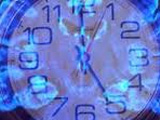|
|
TODAY.AZ / Weird / Interesting
Time and numbers mix together in the brain
20 July 2011 [19:51] - TODAY.AZ
 Clocks tell time in numbers -- and so do our minds, according to a new study which will be published in an upcoming issue of Psychological Science, a journal of the Association for Psychological Science. In two experiments, scientists found that people associate small numbers with short time intervals and large numbers with longer intervals -- suggesting that these two systems are linked in the brain.
Clocks tell time in numbers -- and so do our minds, according to a new study which will be published in an upcoming issue of Psychological Science, a journal of the Association for Psychological Science. In two experiments, scientists found that people associate small numbers with short time intervals and large numbers with longer intervals -- suggesting that these two systems are linked in the brain.It's clear that time and numbers are related in daily life, says Denise Wu of National Central University of Taiwan, who cowrote the new study with Acer Chang, Ovid Tzeng, and Daisy Hung. Numbers are used to represent distance and size, and to go to a farther place usually takes a longer time, for example. But, she says, "Because the tradition of psychology is to manipulate one key variable of interest while controlling other confounding variables as much as possible, these domains were treated independently." Recently, more researchers have started looking at how time and numbers are associated. Wu and her coauthors wanted to look more closely at this relationship, so they came up with a way to look at how numbers interfere with people's perception of time.
In one experiment, each participant sat in front of a computer screen while a single-digit number appeared on the screen for a short time less than a second. After the number disappeared, the word "NOW" appeared on the screen, and the participant was supposed to hold down a key on the keyboard for as long as they thought the number had been displayed. The interaction between time and number was clear: after seeing a large number, like 9, people held the key down for longer than they did for a smaller number, like 2.
In another experiment, people saw a green dot for a short time. When they were asked to press the key, their key-press responses were accompanied by a number on the screen. In that case, they held down the key longer if they saw a small number and for a shorter time if they saw a large number. Wu thinks that happens because the small number makes people think they haven't held down the key for long enough yet.
"We are really excited about this because this means the influence of the digit is so automatic and so immediate," she says. The results suggest that the brain somehow processes time and the size of numbers together -- possibly even with the same neurons. So, maybe instead of having different parts of the brain devoted to different kinds of measurement, there's some part of the brain that is generally responsible for thinking about magnitude.
"It shows that it's not like, mentally, we have a clock and it is immune to all the other information," Wu says. Instead, your concept of time is responding to other things going on in the brain. In this case, it's numbers, but it might also be influenced by emotion. For example, we all know that time passes more slowly in a boring meeting than when you're chatting with a friend; maybe this is related to the ways that timekeeping links to other functions in the brain.
/Science Daily/
URL: http://www.today.az/news/interesting/90937.html
 Print version
Print version
Connect with us. Get latest news and updates.
See Also
- 19 February 2025 [22:20]
Visa and Mastercard can return to Russia, but with restrictions - 05 February 2025 [19:41]
Japan plans to negotiate with Trump to increase LNG imports from United States - 23 January 2025 [23:20]
Dubai once again named cleanest city in the world - 06 December 2024 [22:20]
Are scented candles harmful to health? - 23 November 2024 [14:11]
Magnitude 4.5 earthquake hits Azerbaijan's Lachin - 20 November 2024 [23:30]
Launch vehicle with prototype of Starship made its sixth test flight - 27 October 2024 [09:00]
Fuel prices expected to rise in Sweden - 24 October 2024 [19:14]
Turkiye strikes terror targets in Iraq and Syria - 23 October 2024 [23:46]
Kazakhstan supplied almost entire volume of oil planned for 2024 to Germany in 9 months - 23 October 2024 [22:17]
Taiwan reported passage of Chinese Navy aircraft carrier near island
Most Popular
 What von der Leyen doesn't know about. Or doesn't want to know
What von der Leyen doesn't know about. Or doesn't want to know
 Culture Minister meets with Kyrgyz counterpart in Bishkek
Culture Minister meets with Kyrgyz counterpart in Bishkek
 Trump sees hope for Ukraine-Russia deal, analysts remain skeptical
Trump sees hope for Ukraine-Russia deal, analysts remain skeptical
 Leyla Aliyeva visits school for visually impaired in Hanoi
Leyla Aliyeva visits school for visually impaired in Hanoi
 Pakistani PM hails Lahore-Baku direct flights as key milestone
Pakistani PM hails Lahore-Baku direct flights as key milestone
 Baku court resumes trial of Armenian-origin individuals accused of war crimes
Baku court resumes trial of Armenian-origin individuals accused of war crimes
 Baku to Host Second Turkic Trade and Investment Forum in June
Baku to Host Second Turkic Trade and Investment Forum in June
